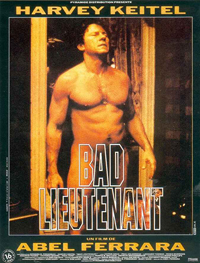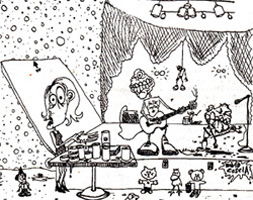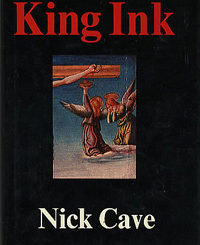 Cine-Trash
Cine-Trash
Bad Lieutenant (Abel Ferrara, 1992)
by William Ham
Here’s a little something different this month: Unlike my previous entries in this column, Bad Lieutenant is not one of those so-bad-it’s-good, aims-high-but-misses-bad films. In fact, this film achieves exactly what it sets out to do. But what it does is something rarely attempted in American film: A horrifying glimpse of a moral abyss in the guise of character study.
Harvey Keitel is the title character, a NYC cop buried up to his fevered brow in drugs, self-abuse, and a growing gambling debt. After a nun is (graphically) raped, the lieutenant grudgingly takes on the case – not for the sake of justice, but for the reward money. Yet somehow, as his corruption worsens and his situation becomes more hopeless, he begins to realize that the case contains the seeds of his last chance at redemption. Bad Lieutenant is, as pompous British film critics would say, “pretty strong meat.” Several scenes are as unflinchingly ugly as any in modern film (which is saying a lot). So why watch this movie? Director/co-writer/Ferrara (King of New York) has a reflexively mesmerizing technique that gives the seamy side of New York a riveting, hallucinatory quality. It bears a twisted sense of Catholicism that makes Mean Streets look like Easter Parade, not to mention a far better use of baseball-as-metaphor than Field of Dreams. But most importantly, it has Keitel, whose courageous performance beats all hell out of what most folks consider “great acting.” His character does very, very few “good” things in this movie, yet he wrenches the emotional core from his part so brilliantly that he actually earns our sympathy. (Watch his “confession” scene near the end and imagine any other actor pulling off what he does there.) Not for all or even most tastes, but if Scorsese is too soft for you, this is your kinda flick. (Incidentally, this is available in two versions: the uncensored NC-17 cut and an R-rated version that excises the most horrible scenes but still retains most of its power. You don’t get to see Harvey’s pee-pee in the latter version, but I guess you could always rent The Piano for that.



